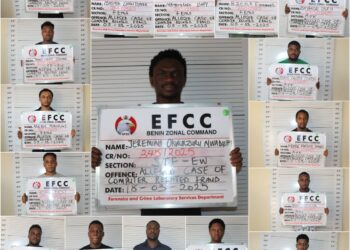Usually, a text message alert from a commercial bank is common for Mr Deji, a forex dealer in Lagos, Nigeria’s commercial hub. But there was something strange about this message which suggested that this was going to be a very unusual day. It was as if his eyes were failing him yet again, so he gave his phone to his wife to read out the text message he had just received.
For all his years of experience as a forex dealer, he had never received an alert for transactions he knew nothing of. So, he pondered over which of his high-profile clients must have sent him money in hard currency without informing him. It would not take long for him to come to realise that this was the first phase of a well-orchestrated scheme of forex related fraud that has caught many innocent dealers across the country.
Grand Heist
According to information reaching Nairametrics, the scheme starts with a routine text message alert to an unsuspecting forex dealer informing him that his account has just been credited. Unbeknownst to him, the transfer into their bank account is the first stage of a grand conspiracy of extortion from internet fraudsters, in conjunction with rogue security agents in the country.
After receiving the text message, security agents appear at the residents of the unsuspecting alert receivers, accusing them of financial fraud. Bewildered, the victims are whisked away and locked up for financial fraud. As we were made to understand, the transfers made to the accounts of victims are often funds stolen from accounts of individuals and corporations based in Europe or the US by a conspiracy ring of wire fraudsters based in Asia, Europe and Nigeria.
Once the money is stolen, they contact their Nigerian counterparts, who provide them with accounts of victims, typically unsuspecting customers with whom they regularly trade forex . Once the account number is provided, funds are transferred into the accounts of these victims, with the intention of immediate extortion.
In one of the most intriguing form of internet wire fraud, the amount transferred into the accounts of the victims is just a decoy as they already know that it will soon be traced by Interpol and possibly returned to the original victim who was robbed.
Before Interpol swoops in, the rogue security agents and the wire ring lock up the unsuspecting victims, forcing them to cough up thousands, if not millions of naira in cash to get out of jail albeit for the time being. As the extortion continues, the account of the victim is frozen until the funds are either seized or returned to security agencies abroad.
By the time the operation is over, victims are duped of thousands of naira by people they have come to know so well.
Indictment
In July this year, a Nigerian, Fawaz Olanrewaju Animasaun was jailed for two years in the United States for defrauding East Texans and others out of nearly $1 million. According to reports, the 27 year old Animasaun, is one of two persons named in a federal indictment for charges of aggravated identity theft and conspiracy to commit bank fraud, as well as aiding and abetting.
The report claims the Nigerians allegedly impersonated actual account holders in emails exchanged with banking and financial services personnel. Through the email conversations, the suspects “… harvested details about the target accounts, including account balances, and obtained wire transfer instructions.”
Once they obtain the details, the information received is used to initiate a wire transfer without the account holder’s knowledge or authorization. The indictment also said that the money was moved through a series of accounts using “money mules,” or people who may or may not have known they were assisting in the transfer; The aforementioned Mr Deji, it will appear falls into this category of mules.
Wire, Wire Economy
Internet fraud is not new to Nigeria and dates to the early nineties when 419 started. Just as it was back then, perpetrators of this crime are often celebrated locally with musicians singing praises of them at any opportunity. They splurge on expensive fashion items, luxury cars and display their wealth at expensive events. Social media has also made them very visible, with the more exuberant bunch displaying some of their wealth on Instagram and Facebook.
They are also noted for contributing to some of the massive real estate growth spurts experienced in some parts of the country, particularly the South East, South West and the Niger Delta. Some of their funds are also being laundered via small business ventures such as hotels, clubs, restaurants and dry-cleaning services.
For Deji, that experience will not deter him from carrying out his business of dealing in forex. Rather, it has shaped the way he does his business and will count as one of the risks in a career he started since losing his job in one of the Nigerian banks.



















